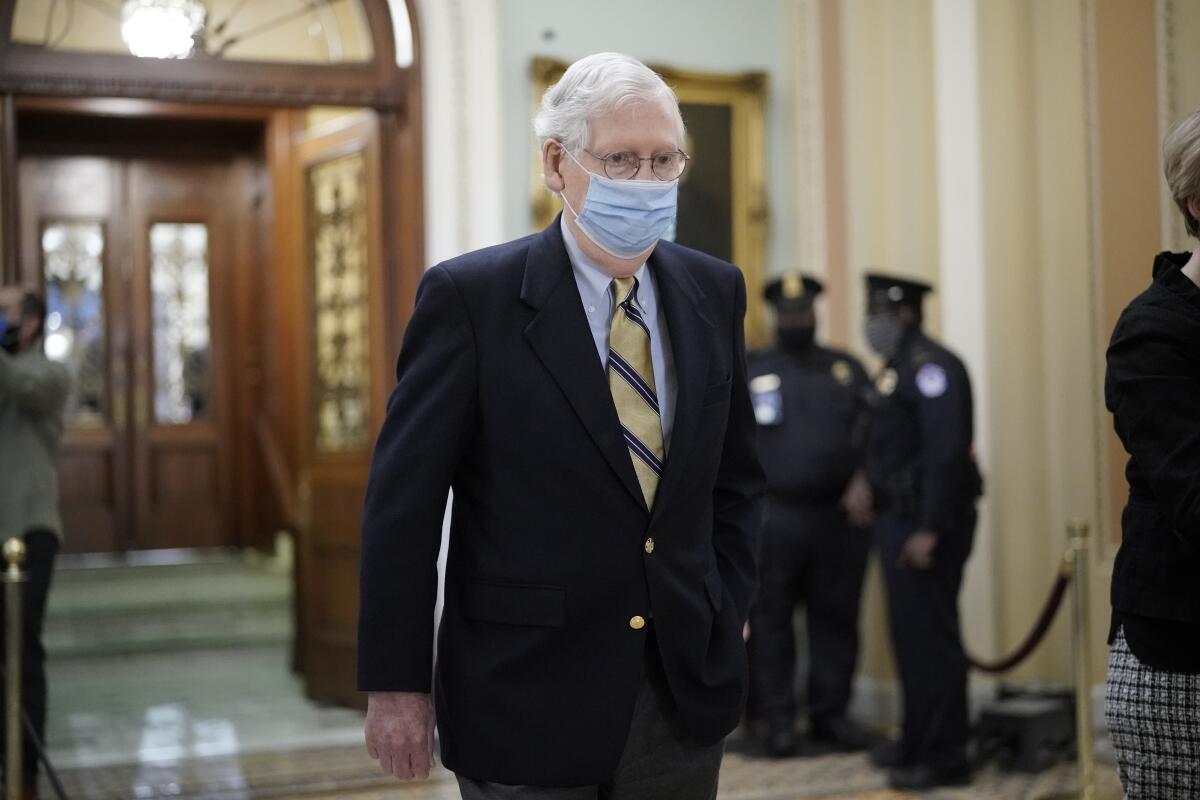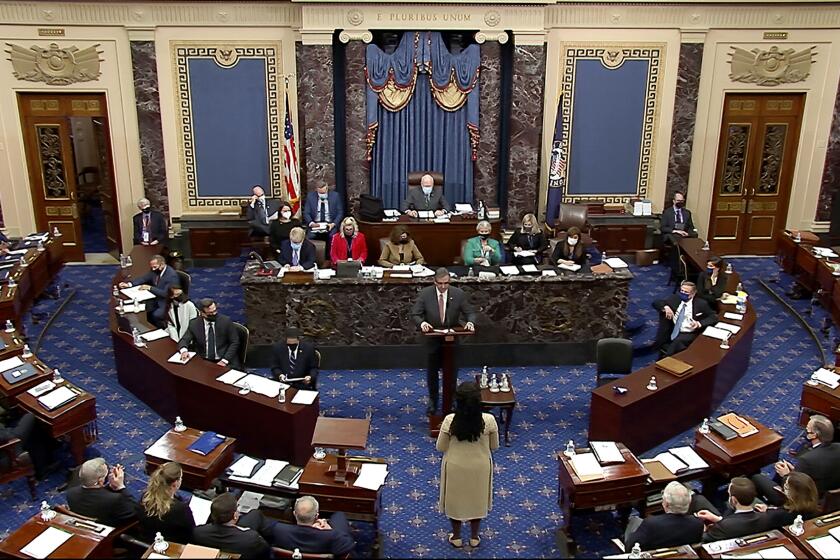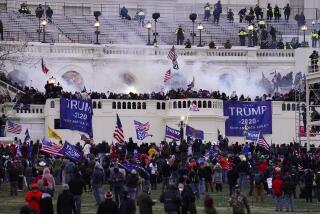McConnell says Trump morally responsible for Jan. 6 attack, but votes to acquit

- Share via
WASHINGTON — Senate Minority Leader Mitch McConnell excoriated Donald Trump on Saturday for being “morally responsible” for the Jan. 6 attack on the U.S. Capitol, but said he voted to acquit him at the impeachment trial because he believes the Senate had no jurisdiction over a former president.
Washington’s most powerful Republican used his strongest language to date to denounce Trump minutes after the Senate voted 57 to 43 to convict Trump, falling short of the two-thirds majority needed to find him guilty.
It was a blunt castigation of Trump by McConnell, who could have used much of the same speech had he instead voted to convict Trump. Had McConnell voted to find Trump guilty, he has enough influence among his caucus that more GOP senators may well have done the same.
Clearly angry, the Senate’s longest-serving GOP leader said Trump’s actions surrounding the attack on Congress were “a disgraceful, disgraceful dereliction of duty.” He even noted that though Trump is now out of office, he remains subject to the country’s criminal and civil laws.
“He didn’t get away with anything yet,” McConnell said.
Even though he was acquitted by the Senate, Trump’s second trial proved that he abused his office (again).
Seven Republicans joined all 48 Democrats and two independents on that vote, creating a clear majority against Trump and a bipartisan denunciation of his actions in helping spark the violent attack on the Capitol by his supporters.
McConnell had signaled last month that he was open to finding Trump guilty, which in itself was an eye-opening signal of his alienation from the Republican former president. His decision on how he would vote was unclear until he sent a private email to GOP senators Saturday morning saying, “While a close call, I am persuaded that impeachments are a tool primarily of removal and we therefore lack jurisdiction.”
He expanded on his rationale on the Senate floor after the roll call vote but went even further, making clear his enmity toward Trump’s actions.
“There is no question, none, that President Trump is practically and morally responsible for provoking the events of that day,” he said.
McConnell’s decision to acquit Trump left the party locked in its struggle to define itself in the post-Trump presidency. Numerous and fiercely loyal pro-Trump Republicans and more traditional Republicans who believe the former president is damaging the party’s national appeal are struggling to decide the GOP’s direction.
A guilty vote by McConnell would have probably done even more to roil GOP waters by signaling an attempt by the party’s most powerful Washington leader to distance the party from a figure still supported by most of its voters.
Many had expected the Kentucky senator to vote to clear Trump of the charges, based on McConnell’s history as a GOP loyalist who takes few major risks. But before Saturday, he had said little in public or private about his mindset, and no one was certain what he would decide.
McConnell jarred the political world just minutes after the Democratic-led House impeached Trump on Jan. 13, writing to his GOP colleagues that he had “not made a final decision” about how he would vote at the Senate trial.
McConnell had also told associates he thought Trump perpetrated impeachable offenses and saw the moment as a chance to distance the GOP from the damage the tumultuous Trump could inflict on it, a Republican strategist told the Associated Press at the time, speaking on condition of anonymity to describe private conversations.
But since this week’s trial began, McConnell voted with a majority of Republicans against proceeding with the trial on the grounds that Trump was no longer president.
Over 36 years in the Senate, the measured McConnell has developed a reputation for inexpressiveness in the service of caution. The suspense over how he was going to vote underscored how much is at stake for McConnell and his party.
McConnell spent the days-long trial in his seat in the Senate chamber, staring straight ahead.
A guilty vote by McConnell would have enraged many of the 74 million voters who backed Trump in November, a record for a GOP presidential candidate. That could expose Republican senators seeking reelection in 2022 to primaries from right-wing challengers seeking revenge, potentially giving the GOP less appealing general election candidates as they try to win back Senate control.
McConnell’s decision will no doubt color his legacy. He turns 79 next Saturday and wouldn’t face reelection for almost six years were he to run again. Even critics say McConnell likes to play the long game.
McConnell maneuvered through Trump’s four years in office like a captain steering a ship through a rocky strait on stormy seas. Battered at times by vindictive presidential tweets, McConnell made a habit of saying nothing about many of Trump’s outrageous comments. He ended up guiding Republicans to victories such as the 2017 tax cuts and the confirmations of three Supreme Court justices and more than 200 other federal judges.
His relationship with the president plummeted after Trump’s denial of his Nov. 3 defeat and relentless efforts to reverse the voters’ verdict with his baseless claims that Democrats stole the election by fraud.
It withered completely last month, after Republicans lost Senate control with two Georgia runoff defeats many blamed on Trump, and the savage attack on the Capitol by Trump supporters. The day of the riot, McConnell railed against “thugs, mobs or threats” and described the attack as a “failed insurrection.”
A week later, the Democratic-controlled House impeached Trump on a charge of inciting an insurrection. Six days after that, McConnell said, “The mob was fed lies,” and added, “They were provoked by the president and other powerful people.”
More to Read
Get the L.A. Times Politics newsletter
Deeply reported insights into legislation, politics and policy from Sacramento, Washington and beyond. In your inbox three times per week.
You may occasionally receive promotional content from the Los Angeles Times.











